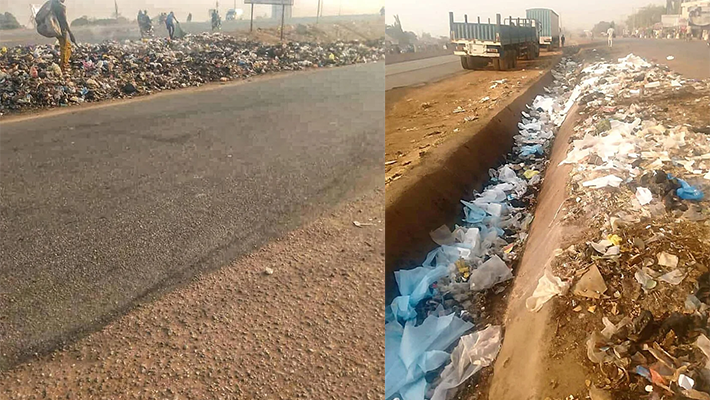By Tonnie Iredia
In several issues and events, Lagos, leads all other towns and cities in Nigeria. It is the country’s largest city as well as its commercial nerve centre. It has also been home to the largest number of collapsed buildings just as it leads in the number of illegal structures which have had to be demolished now and again by the state government.
Indeed, no other location can favourably compete with Lagos in the number of times, that drainages, channels and canals are repeatedly cleared of refuse and immediately blocked from time to time. The consequential loss of lives and property arising from pervasive recklessness in environmental issues characterized by indiscriminate waste disposal seems to suggest that Lagosians are not interested in learning lessons.
From the above, it would be uncharitable to criticize Tokunbo Wahab the Lagos State Commissioner for Environment and Water Resources for insisting on clearing any obstruction on the right of way in any part of Lagos. Wahab has since been firing from all available cylinders. One area where he has sent his enforcement team is Apapa where he has tried to re-establish the three metres drainage Right of Way for all its drainage channels. The enforcement activities commendably began after the expiration of notices and convening of meetings of several stakeholders especially property owners, to voluntarily move their fences that fall within the drainage setback.
Another assignment has been the demolition of over 100 shanties, housing illegal squatters at Adeniji Adele Underbridge. The action is reportedly part of the avowed commitment of the present administration under Babajide Sanwo-Olu to reclaim all ungoverned spaces that dot the Lagos landscape and which represent a distorted image of what a smart city like Lagos should be. The enforced clean-up exercise of underbridges across the metropolis, had also occurred in Ijora, Apongbon, Obalende, Dolphin, where several illegal squatters were displaced. According to Commissioner Wahab, the unsanitary conditions of residents in the shanties patently serve as hiding places for criminals and points for peddling hard drugs and substances which are injurious to the wellbeing of law-abiding residents.
Although Wahab has been shy of using the word ‘remove’ in place of the harsher term ‘demolish’, credit must necessarily go to the Commissioner for his massive public enlightenment schemes before, during and after the removal exercises. But one reason why the word ‘demolish’ cannot be truly described as hard in Lagos is that despite several painful exercises, many people are still building on or blocking the right of way. A strategic move by the Commissioner was his effective use of the media to show openness in his dialogue sessions with stakeholders which easily removed public sympathy for violators before their structures were demolished. In one instance, the public watched in dismay, a request by Wahab on national television for those aggrieved to show their approved building plans to which everyone remained mute.
The realization that the current exercise of massive clearance of blockages from canals etc. is not new, makes the case of continuous violations clearly unacceptable. Tunji Bello, a former Commissioner of the same Ministry had an expansive exercise which lasted more than half a year in 2020. Commissioner Bello had at the time educated citizens on the expedience of cleaning and clearing blockages so as to ensure a free flow of water through all the channels all year round. What prompted the exercise at the time was flooding in different parts of the state which had led to loss of lives and property. While thanking the Commissioner for helping to ransack the Ilo River, which drastically reduced flooding in the area, the community gave the assurance that they would take ownership of the exercise by putting in place a committee to monitor the drains against future refuse dumping.
Unfortunately, many citizens have since breached the assurances of good environmental practices given to government by different communities. In addition, there now exist, violators of building regulations who even experiment with erecting structures in locations that had been cleared by officials prompting calls for owners of illegal structures to be made to bear the cost of the demolitions of their structures. As for locations with approved building plans, some developers arbitrarily alter their approvals. For example, one developer with an approval for a 6-floor mixed-use construction at Ikeja GRA allegedly added 2 floors to the ongoing construction thereby attracting governments’ revocation of the planning permit. Incidentally, the law prohibits a developer from modifying, altering, or adding to the development without obtaining statutory documentation from the approving office.
While commending the Lagos state government for its efforts so far, she can hardly escape from blame for the unending contributory negligence of her planning and building officials who collude with citizens to breach laws and guidelines. After the colossal loss of lives and property estimated at N60 billion from the collapsed 21-storey building in Ikoyi in 2021, one would have expected building laws to be so strictly monitored to avoid such painful occurrences in Lagos. But that has not been the case. Rather, as it is in most parts of Nigeria, Lagos officials once financially induced by violators always actively look the other way. Otherwise, how do we explain the collapse of several other buildings since the Ikoyi 2021 experience?
About a year ago, no less than 13 residential buildings at the Ajao Estate area of the state were demolished. The buildings were said to have been constructed along aviation fuel pipelines and close to the Murtala Mohammed International Airport. At the point of demolition, the buildings which had been occupied by citizens for years were said to lack approved building plans. Where were the relevant state officials when the buildings were under construction? Alas, it is an open secret in our part of the world that once developers ‘see’ compromised officials, their buildings are spared until something drastic around the area invites demolition while those appointed to monitor structures in such areas feign ignorance. Government often overlooks authors of the fake approvals which unsuspecting citizens procured from otherwise bonafide officials.
At about the same time of the Ajao Estate demolitions, the government reportedly vowed that it would prosecute physical planning violators. The vow was made during the arrest of some 3 workmen who allegedly broke official seal to continue an illegal construction on a sealed propertyaround Parkview Estate in Ikoyi. Considering that it is already a year since the arrest took place, when will the workmen be prosecuted and when will Nigerians hear of the arrest of the owner and developer of the property on whose authority the seal was allegedly broken? History prompts one to conclude that as usual, it would be against the run of play for those behind the violations who may have since ‘seen’ the appropriate supervising officials to ever face prosecution.
In 2020,Idris Salako the then Commissioner for Physical Planning and Urban Development had similarly vowed to unravel what he called the cartel behind fake building plan approvals in the state. He also expressed his determination to ensure their prosecution in line with the extant laws. Salako spoke during an enforcement operation in Pinnock Estate around Lekki where he also ordered the sealing of 42 buildings in the estate for unapproved and illegal construction. But should such happen in a location which has a State Physical Planning Permit Authority; State Building Control Agency; State Urban Renewal agency; State Planning and Environmental Monitoring Agency as well as State Safety Commission? In truth, with them all in existence, official pronouncements and implementation ought to seamlessly converge.
There are however persons in the building industry in Lagos who have evidence that the declaration by the State Physical Planning Authority that a building permit is obtainable in 10 days is cunning. A respondent to my questionnaire while preparing this piece stated that there are no less than 27 separate documents to be submitted to obtain the permit. While the necessity for some is doubtful, others appear designed to make an applicant pay several hidden and unofficial charges. It is perhaps this loophole that developers exploit to continue to breach the law. As a proactive administration, which has no doubt added value to Lagos, Sanwo-Olu needs to upgrade the computerized system with which government deals with citizens. He also needs to work towards a zero-tolerance system for proper monitoring of officials and systems.
Culled from Vanguard













